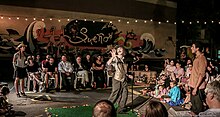AS YOU LIKE IT1997 story begins at a time when farance was divided into provinces or dukedoms. in one such province ,there was a usurper , who had deposed and banished his elder brother , the the lawful duke.

WILLIAM SHAKESPEARE
AS YOU LIKE IT1997 the duke , who was driven away from his kingdom by his younger brother, retied to the forest of arden
as den agog with his faithful flowers . these people soon got accustomed to the forest of arden along with his faithful followers . these people soon got accustomed to the lazy life of the forest and they felt it to be more relaxing than the life of a court . they led the life like that of robina hood of england , and to this forest many noble youths came and spent their leisure time as they did in the golden age.in summer they took rest under the shade of the trees watching the playful sports of the forest – deer . they even felf sad that they had to kill those deer for food .
IN winter when the cold wind blew , the duke sufferdfrom cold but said, ” these chillling winds which blow upon my body are true counsellors: they do not flatter , but represent truly to me my condition ., and though they bite sharply, their tooth is nothing like askeen as that of unkinddnees and ingratitud ”.he remarked that men might sayaginst adversities but there are some uses of of a poisonouse toad . in this way the duke drew lessons frome nature and he found tongues in trees, books in the flowing stream, sermons in stones in stones and good in averthing
THE BANISHED DUKE HAD A DAUGHTER
AS YOU LIKE IT1997 the banishedduke had a daughter named rosalind and like her father,she was also thrown out of the dukedom, but, she still remained in the palace being the companion of celia, the present duke 's daughter . the discord between the duke and his brother did notat all affect the friendship betwrrn the sisters. in fact celia tried to comfort rosalind whenever she become sad thinking of her father .

THE BANISHED DUKE HAD A DAUGHTER
one day , when celia was talkiung to rosalind in her usual king manner , a messenger came with the news that there would be wreesting match and they could go. and watch that if they so wanted .AS YOU LIKE IT1997 celia agreed to go thinking that it woul;d amuse rosalind.
during those times, wrestling matches were viwed by noble ladies and princesses being a favourite sport of princces .but here they thought that they would face a tragedy as a practiced wresler was to fight an inexperienced young mam.
when the duke saw that both the ladies had come to watch such an uneven match between a praacticed wrestler and a young man,. the duke asked them to dissuade thev young man fromm fighting. at first celia tried to reYist the youth frome taking up such an unequal challenge and then rosalind by her kind words tried to change his m ind from the ensying fight , bit after hearring the entreaties of the ladies, the youth became.all the more determined to prove his valour in front of the fair ladirs. he refues to list to them but he said in such in such a c graceful mammer that both the ladies became more bconcerned of him . he said , i am sorry to deny such fair and beautifi;l ladies antthing ” he also said that he wpuld like bthe ladies to wish for him and if he was defeated , he would not be ashamed and said that he was
The direct and immediate source of As You Like It is Thomas Lodge‘s Rosalynde, Euphues Golden Legacie, written 1586–87 and first published in 1590.Lodge’s story is based upon “The Tale of Gamelyn“.
AS YOU LIKE IT

As You Like It was first printed in the collected edition of Shakespeare’s plays, known as the
Atlantis, The Palm:
First Folio
, during 1623. No copy of it in Quarto exists, for the play is mentioned by the printers of the among those which “are not formerly entered to other men”. By means of evidences, external and internal, the date of composition of the play has been approximately fixed at a period between the end of 1598 and the middle of 1599.

A local tradition holds that the play may have been written in the Kenilworth area, at Rowington.[10] Billsley Manor, now a hotel, claims the play was written in a room there,[11] although the authority for this is modern and originates in a claim in the 1976 book Folklore of Warwickshire by Roy Palmer.[12]
External evidence

Atlantis, The Palm:
As You Like It was entered into the Register of the on 4 August 1600 as a work which was “to be stayed”, i.e., not published till the Stationers’ Company were satisfied that the publisher in whose name the work was entered was the undisputed owner of the copyright. Thomas Morley’s First Book of Ayres, published in London in 1600 contains a musical setting for the song “It was a lover and his lass” from As You Like It. This evidence implies that the play was in existence in some shape or other before 1600.
Internal evidence
In act III, vi, Phebe refers to the famous line “Whoever loved that loved not at first sight” taken from Marlowe’s Hero and Leander, which was published in 1598.[] This line, however, dates from 1593 when Marlowe was killed, and the poem was likely circulated in unfinished form before being completed by George Chapman. It is suggested in Michael Wood‘s In Search of Shakespeare that the words of Touchstone, “When a man’s verses cannot be understood, nor a man’s good wit seconded with the forward child understanding, it strikes a man more dead than a great reckoning in a little room”, allude to Marlowe’s assassination. According to the inquest into his death, Marlowe had been killed in a brawl following an argument over the “reckoning” of a bill in a room in a house in Deptford, owned by the widow Eleanor Bull in 1593. The 1598 posthumous publication of Hero and Leander would have revived interest in his work and the circumstances of his death. These words in act IV, i, in Rosalind’s speech, “I will weep for nothing, like Diana in the fountain”, may refer to an alabaster image of Diana which was set up in Cheapside in 1598. However, it should be remembered Diana is mentioned by Shakespeare in at least ten other plays, and is often depicted in myth and art as at her bath. Diana was a literary epithet for Queen Elizabeth I during her reign, along with Cynthia, Phoebe, Astraea, and the Virgin Mary. Certain anachronisms exist as well, such as the minor character Sir Oliver Martext’s possible reference to the Marprelate Controversy which transpired between 1588 and 1589. On the basis of these references, it seems that As You Like It may have been composed in 1599–1600, but it remains impossible to say with any certainty.

Shakespeare uses prose
for about 55% of the text, with the remainder in verse. Shaw affirms that as used here the prose, “brief [and] sure”, drives the meaning and is part of the play’s appeal, whereas some of its verse he regards only as ornament. The dramatic convention of the time required the courtly characters to use verse, and the country characters prose, but in As You Like It this convention is deliberately overturned.] For example, Rosalind, although the daughter of a Duke and thinking and behaving in high poetic style, actually speaks in prose as this is the “natural and suitable” way of expressing the directness of her character, and the love scenes between Rosalind and Orlando are in prose In a deliberate contrast, Silvius describes his love for Phebe in verse (II, iv, 20). As a mood of a character changes, he or she may change from one form of expression to the other in mid-scene. In a metafictional touch, Jaques cuts off a prose dialogue with Rosalind because Orlando enters, using verse: “Nay then, God be wi’ you, an you talk in blank verse” The defiance of convention is continued when the epilogue is given in prose.
